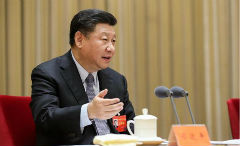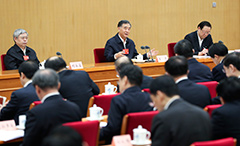China cuts poor population by two-thirds
2018-01-05
Xinhua
BEIJING — China has reduced poverty by more than two-thirds over the past five years, a senior poverty alleviation official said on Jan 5.
There were around 30 million Chinese living below the national poverty line at the end of last year, compared with 98.99 million in 2012, Liu Yongfu, director of the State Council Leading Group Office of Poverty Alleviation and Development, said at a news conference.
“We are closer to the goal of eradicating absolute poverty,” Liu said.
Poverty alleviation has become one of China’s “three tough battles” for the next three years, as the country aims to eliminate absolute poverty by 2020 in a bid to create a “moderately prosperous society.”
Decisive progress has been made. With 28 counties casting off poverty in 2016, China shortened its list of poorest counties for the first time in more than 30 years, Liu said, predicting the number would rise to around 100 in 2017.
A county can be removed from the list if no more than 2 percent of its residents earn less than 2,300 yuan ($350 dollars) at 2010 prices. In western regions, the threshold is 3 percent.
But Liu said that the task was still arduous, saying “to lift the remaining 30 percent of poor people out of poverty will be the toughest.”
Policy makers have listed poverty alleviation as one of China’s “three tough battles” for the next three years, along with risk prevention and pollution control. The year 2018 is a key year for the battle, Vice-Premier Wang Yang said at a meeting last week, asking for improved policies and measures.
The work will shift to areas hit the hardest by poverty, put more emphasis on quality, and be more targeted and precise, Liu said. “We will work to foster local industries, create new jobs, relocate residents in poor areas...and strengthen aid to the aged, the disabled and people seriously ill.”
Nearly 30,000 Chinese villages currently see more than 20 percent of their residents living below the poverty line, which is considered a weak link in the anti-poverty task.
“We will step up support...partly by sending more central and provincial cadres to those villages...who will work there for normally two years,” said Xia Gengsheng, another official of the State Council Leading Group Office of Poverty Alleviation and Development.
Among the dispatched will be senior officials, as in west China’s Xinjiang, their ranks could reach as high as the bureau-director level, which is equal to a mayor from a medium-sized city.
A year-long campaign will also be launched to deal with undesirable work styles, such as formalism and bureaucracy, in poverty alleviation, according to Liu.


